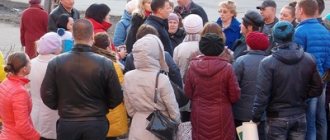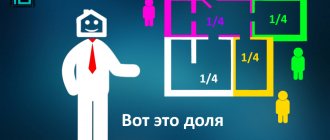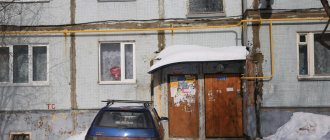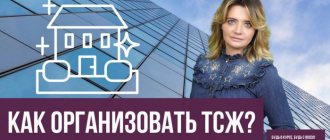How to hold a general meeting of premises owners in an apartment building?
Lawyer Antonov A.P.
The general meeting of owners of premises in an apartment building is the management body of the apartment building. It is held for the purpose of managing an apartment building by discussing agenda items and making decisions on issues put to vote. Persons who have accepted the premises in this house from the developer under a transfer deed or other transfer document (Part 1, 1.1 of Article 44 of the Housing Code of the Russian Federation) can participate in the general meeting of premises owners within a year from the date of issuance of permission to put the house into operation. A general meeting of owners can be held (clause 9 of article 2, clause 3.2 of part 2 of article 44, article 44.1, part 1, 3 of article 47, article 47.1 of the Housing Code of the Russian Federation; clauses 1.1, 1.2 , 1.3 of the Procedure, approved by Decree of the Moscow Government dated 02/27/2018 N 115-PP; clauses 6.1.2, 6.1.3 of the Rules, approved by Decree of the Moscow Department of Information Technologies dated 02/27/2018 N 64-16-87 /18): in person (with the joint presence of the owners of premises in a given building to discuss issues on the agenda and make decisions on issues put to vote); in the form of absentee voting (by poll or using information systems). At the same time, in order to use the GIS “Housing and Communal Services” or regional information systems (for example, in Moscow - the information system of the “Active Citizen” project or other information systems that can be accessed through the Moscow Public Services Portal), it is necessary for the owners to make an appropriate decision in in the case of direct management of apartment buildings by premises owners. To use other information systems, it is necessary for the owners to make a decision, regardless of the method of managing the apartment building. Absentee voting (by poll) can also be carried out if the meeting in person did not have a quorum; in the form of absentee voting (the possibility of in-person discussion of agenda items and making decisions on issues put to vote, as well as the possibility of transferring decisions of owners within a specified period to the place or address indicated in the notice of holding a general meeting of owners of premises in an apartment building home). The general meeting of owners of premises in an apartment building is valid (has a quorum) if the owners of premises in the building or their representatives with more than 50% of the total number of votes took part in it. An exception is the meeting (Part 3, 3.2 of Article 45 of the Housing Code of the Russian Federation): on the issue of transferring residential premises to non-residential premises, which has a quorum if the owners of the premises or their representatives with more than 50% of the total number of votes took part in it, including owners of premises located in the same entrance as the premises being transferred, who have more than 2/3 of the total number of votes of such owners (if there is more than one entrance in the house). If the house has one entrance, such a meeting has a quorum if the owners of the premises or their representatives with more than 2/3 of the total number of votes took part in it; on the issue of including an apartment building within the boundaries of a residential development territory subject to integrated development, as well as on the exclusion of an apartment building from the boundaries of the specified territory, from the draft decision (from the decision) on the integrated development of a residential development territory, which has a quorum if the owners took part in it residential premises or their representatives holding more than 50% of the votes of the total number of votes of the owners of residential premises. At the same time, in relation to residential premises provided under social tenancy agreements or under lease agreements for residential premises of the housing stock for social use, the representatives of the owners are the tenants of such premises. When calculating the quorum, persons who have accepted premises in a given house from the developer under a transfer deed or other transfer document are also taken into account, who can take part in the meeting within a year from the date of issuance of permission to put the apartment building into operation (Part 1.1 of Article 44 of the Housing Code of the Russian Federation ; Letter of the Ministry of Construction of Russia dated February 26, 2020 N 5607-OG/04). To hold a general meeting of premises owners in an apartment building, we recommend following the following algorithm.
Step 1. Initiate a general meeting of owners. The annual general meeting of owners of premises in an apartment building is held annually, during the second quarter of the year following the reporting year, unless otherwise established by the general meeting of owners (Part 1 of Article 45 of the Housing Code of the Russian Federation). In addition to the annual general meeting, the owners of premises in an apartment building can hold extraordinary general meetings (Part 2 of Article 45 of the Housing Code of the Russian Federation). An extraordinary general meeting can be convened: at the initiative of any of the owners (Part 2 of Article 45 of the Housing Code of the Russian Federation); at the initiative of the board of the HOA (if an HOA has been created in the house) (clause 8 of Article 148 of the Housing Code of the Russian Federation); at the initiative of the management organization (part 7 of article 45 of the Housing Code of the Russian Federation); management organization, HOA, housing complex, housing cooperative, other specialized consumer cooperative upon a written request from owners holding at least 10% of the total number of votes of the owners of premises in an apartment building (Part 6 of Article 45 of the Housing Code of the Russian Federation); on the initiative of an authorized body of state power or local government that has prepared a draft decision on the integrated development of a residential territory, or a legal entity designated by the Russian Federation or a constituent entity of the Russian Federation to implement such a decision - on the issue of including a house within the boundaries of the specified territory (Part 2.1 of Article 45 Housing Complex of the Russian Federation).
Step 2. Prepare for the general meeting of owners. At this stage, you should formulate the agenda for the general meeting of owners and decide on the form of voting. When voting in person or in absentia, it is necessary to select the time and place of the meeting to discuss the agenda items, select candidates for the chairman, secretary, and members of the counting commission. In addition, it is necessary to prepare an information message about the holding of a general meeting of owners, a register of owners, forms of decisions on issues put to vote, protocol forms (parts 4, 5 of article 45, part 1 of article 46 of the Housing Code of the Russian Federation; clauses. 3, 4, 20 Requirements, approved by Order of the Ministry of Construction of Russia dated January 28, 2019 N 44/pr). In the case of holding the first general meeting of owners in absentia using the GIS "Housing and Communal Services", the powers of the administrator of the general meeting are exercised by its initiator. To conduct subsequent general meetings in absentia using the specified system, the agenda includes questions about determining the administrator of the general meeting, the procedure for receiving messages about general meetings, decisions of owners on issues put to vote, as well as the duration of voting on agenda items days (part 2.1 of article 47.1 of the Housing Code of the Russian Federation).
Step 3. Notify the owners about the general meeting. Each owner of premises in an apartment building should be notified no later than 10 days before the date of the general meeting. Depending on what method of informing was previously established by the general meeting, you can place the relevant information in publicly accessible places, deliver a notification against signature to each owner, or send it by registered mail (part 4 of article 45, part 5 of article 47.1 of the Housing Code of the Russian Federation). When using an information system to hold a general meeting of owners, a message about the meeting is posted by the administrator in this information system, and is also sent to each owner of the premises in the apartment building. In addition, in the case of holding the first general meeting of owners using the GIS "Housing and Communal Services", it is necessary, in particular, to inform the owners of the premises about the procedure for submitting a written refusal to hold such a meeting, as well as about the rules for access to the system for persons not registered in it (clause p. 4.7, 4.10, 4.11 of the Rules; part 5 of article 47.1 of the Housing Code of the Russian Federation). The notice of the general meeting must contain information about the initiator of the general meeting, the form, date, place and time of the meeting, the agenda, the procedure for familiarizing with the information and materials that will be presented at the meeting, as well as the place or address where they can be accessed familiarize. If a general meeting is held in the form of absentee voting, the message indicates the end date for accepting decisions of the owners, the place or address where such decisions should be transferred (Part 5 of Article 45 of the Housing Code of the Russian Federation). At the same time, the first general meeting in absentia using the GIS “Housing and Communal Services” cannot be held if the administrator of the general meeting receives information about the presence of written refusals to hold this meeting of owners holding more than 50% of the votes of the total number of votes of the owners of the premises (Part. 2.1, 5, Article 47.1 of the Housing Code of the Russian Federation).
Step 4. Hold a general meeting of owners. The number of votes that each owner has is proportional to his share in the right of common ownership of the common property in the house and is fully taken into account when summing up the voting results. Voting as part of the votes belonging to the owner is not provided for by law (Part 3 of Article 48 of the Housing Code of the Russian Federation; Clause 1 of the Letter of the Ministry of Construction of Russia dated October 5, 2017 N 35851-EC/04). If the meeting is held in person, all owners of premises present at the meeting must be registered. If there is a quorum, you can begin to consider the issues included in the agenda, having previously elected the chairman and secretary of the general meeting, as well as members of the counting commission. The General Meeting does not have the right to make decisions on issues not included in the agenda, or to change the agenda of the meeting (Parts 1, 2, Article 46 of the RF Housing Code; clauses 12, 13, 15 of Requirements No. 44/pr). If the meeting is held in absentia, the owners submit voting forms on time and to the address indicated in the notice of the general meeting, or directly vote electronically using the information system (Part 1, Article 47, Part 6, Art. 47.1 Housing Code of the Russian Federation; clause 5.3 of the Rules). If the meeting is held in the form of in-person and absentee voting, then the meeting participants must have the opportunity to discuss the issues on the agenda and submit voting forms within the prescribed period to the place or address indicated in the notice of the general meeting (Part 3 of Article 47 of the Housing Code of the Russian Federation ). As a general rule, decisions of the general meeting of owners on issues put to vote are adopted by a majority vote of the total number of votes of the owners participating in this meeting (Part 1, Clause 2, Part 1.2, Article 46 of the Housing Code of the Russian Federation). The exceptions are (clauses 1, 1.1, 1.1-1, 1.2, 2, 3, 3.1, 4.2, 4.3, 4.5, 4.6, part 2, article 44, part 1, clause 1, part 1.2, part. 1.3 Article 46, Part 1 Article 136 of the Housing Code of the Russian Federation): decisions taken by more than 50% of the total number of votes of owners of premises in apartment buildings on the choice of method for forming a capital repair fund, the choice of a person authorized to open a special account and carry out transactions with funds located on it, on granting the council of the apartment building the authority to make decisions on the current repair of common property in the apartment building and decisions on the creation of a homeowners association in one apartment building; individual decisions made by a majority of at least two-thirds of the total number of votes of the owners of premises in an apartment building, for example, decisions on the reconstruction of an apartment building, on the construction of outbuildings and other buildings, structures, structures, on the reconstruction and (or) redevelopment of premises included into the composition of the common property of the apartment building, on the limits of use of the land plot on which the apartment building is located, on the use of the common property of the owners of premises in the apartment building by other persons; decisions on consent to the transfer of residential premises to non-residential premises if there is more than one entrance in the house, adopted by a majority vote of the total number of votes of the owners taking part in the meeting, subject to voting for the adoption of this decision by the owners of premises located in the same entrance with the transferred premises, having a majority of votes from the total number of votes of such owners; a decision on the inclusion of an apartment building within the boundaries of a residential development area subject to integrated development, in accordance with the draft relevant decision, adopted by at least two-thirds of the votes of the owners of residential premises or their representatives from the total number of votes of the owners of residential premises; a decision on the exclusion of an apartment building from the boundaries of the residential development territory subject to integrated development, and from the draft corresponding decision, adopted by at least one-third of the votes of the owners of residential premises or their representatives from the total number of votes of the owners of residential premises. Regardless of the form of voting (in-person, in-person, absentee or absentee), the owner’s decision on issues put to vote must indicate (Part 5.1, Article 48 of the RF Housing Code; Clause 5 of Letter N 35851-EC/04): 1) information about the person participating in voting, providing the opportunity to identify the specified person, including full name. (the latter - if available) completely; 2) information about the document confirming the ownership of the person participating in the vote to the premises in the corresponding apartment building; 3) decisions on each item on the agenda, expressed in terms of “for”, “against” or “abstained”.
Step 5. Document the voting results. The decision of the general meeting of owners of premises in an apartment building is documented in minutes. The minutes of the general meeting are drawn up in writing within the time limits established by the general meeting, but no later than 10 calendar days from the date of the general meeting (part 1 of article 46 of the RF Housing Code; clause 2 of Requirements No. 44/pr). The minutes of the general meeting should indicate the name of the document, the date and number of the minutes, the date, place of the general meeting, the title to the content of the minutes, the content of the minutes (in particular, the agenda, the competence of the general meeting (the presence or absence of a quorum), the number of votes on each issue), information about the place (address) of storage of protocols and decisions of premises owners on issues put to vote. If the content of the protocol contains an indication of the presence of proposals, the documents listed in it are attached to the protocol. As a general rule, the protocol is signed by the chairman, secretary of the meeting and the persons who counted the votes (clause 4, Section II of Requirements No. 44/pr). The person on whose initiative the general meeting was convened must submit the originals of the decisions and minutes of the general meeting of premises owners to the management organization, the board of the HOA, housing complex, housing cooperative, other specialized consumer cooperative, in the case of direct management of apartment buildings - to the housing supervision authority, and in in certain cases, to the resource supplying organization, regional operator for the management of municipal solid waste - copies of decisions and minutes of the meeting no later than 10 calendar days after the holding (end) of the general meeting (part 1 of article 46 of the Housing Code of the Russian Federation; clause 4 of the Procedure, approved By Order of the Ministry of Construction of Russia N 44/pr).
Note! In order to prevent the spread of coronavirus infection (COVID-19), the deadline for sending original decisions and protocols may be extended until the relevant restrictions are lifted in the constituent entity of the Russian Federation (Letter of the Ministry of Construction of Russia dated 04/07/2020 N 10966-OG/04).
In Moscow, the body of state housing supervision is the Moszhilinspektsiya (clause 1 of the Regulations, approved by Resolution of the Moscow Government of July 26, 2011 N 336-PP). The state housing supervision body, if within three months in a row it receives two or more minutes of the general meeting of owners of premises in an apartment building, containing decisions on similar issues on the agenda, is obliged to conduct an unscheduled inspection in order to establish the fact of compliance with legal requirements when organizing, holding and registration of the results of such a meeting (Part 1.1 of Article 46 of the Housing Code of the Russian Federation).
Step 6. Inform all owners about the voting results and decisions made. The voting results and decisions made at the general meeting are brought to the attention of the owners of the premises in the house by the initiator of the meeting no later than 10 days from the date of adoption of these decisions. The message is posted in the premises of the house, determined by the decision of the general meeting of owners and accessible to all owners (Part 3 of Article 46 of the Housing Code of the Russian Federation). Decisions of the general meeting in the form of absentee voting conducted using the information system are automatically generated in the form of a protocol and posted in this system within an hour after the end of voting (Part 11, Article 47.1 of the Housing Code of the Russian Federation; Clause 3.30 of Procedure No. 115-PP).
Note! The decision of the general meeting of owners, adopted in the prescribed manner, on issues within the competence of such a meeting, is mandatory for all owners of premises in an apartment building, including those who did not participate in the vote (Part 5 of Article 46 of the Housing Code of the Russian Federation) .
Step 7. Appeal the decision of the general meeting (if necessary) An owner who did not take part in the voting or voted against the decision, who believes that this decision violated his rights and legitimate interests, has the right to appeal to the court a decision made in violation of the requirements of the Housing Code of the Russian Federation, in within six months from the day when he learned or should have learned about the decision made. The court, taking into account all the circumstances of the case, has the right to uphold the appealed decision if the vote of the said owner could not influence the voting results, the violations committed are not significant and the decision made did not entail causing losses to the owner (Part 6 of Article 46 of the RF Housing Code).
Sincerely, lawyer Anatoly Antonov, managing partner of the law firm Antonov and Partners.
Still have questions for your lawyer?
Ask them right now here, or call us by phone in Moscow +7 (499) 288-34-32 or in Samara +7 (846) 212-99-71 (24 hours a day), or come to our office for a consultation (by pre-registration)!
Art. 44 Housing Code of the Russian Federation with comments
The privatization of housing stock in Russia has created a rather difficult situation. Most apartment buildings do not have one owner. Such structures consist of many areas owned by citizens, legal entities, municipalities, etc. This significantly complicates property management. Taking this circumstance into account, the Code norm in question establishes a special form of discussion of issues related to MKD. The General Meeting is considered the only administrative body. It exists throughout the entire period of the existence of the MKD.
Shared facilities
Their list is enshrined in Article 36 of the Code. The common property of an apartment building should include:
- The plot of land on which the structure stands.
- Elements of landscaping and landscaping.
- Other facilities located on this site and used for maintenance, operation and other needs of the apartment building.
Thus, issues regarding the construction of utility and other structures can only be discussed on the territory belonging to an apartment building. At the same time, buildings must have a specific purpose - providing maintenance, improvement, and operation of apartment buildings.
Exclusivity of powers
It manifests itself in the fact that on certain issues no other body except the general meeting can hold a discussion. Other structures, for example, include the board of the HOA. Possibility of discussing some issues of Art. 44 of the RF Housing Code provides for other bodies. Thus, members of the partnership can agree on the rental or transfer of other rights to material assets used by the owners of living space in apartment buildings. But, for example, issues such as choosing an administration option or forming an HOA can only be discussed by a general meeting. The unifying feature of the problems falling within the exclusive competence of this body is their fundamental nature. Decisions made on such issues are long-term in nature.
Important point
The specifics of discussing issues related to re-equipment in a structure should be taken into account. Thus, if it leads to a decrease in the volume of common property, then, taking into account the provisions of Articles 36 and 40 of the Code, the decision must be made unanimously by all owners in general or by all participants. In the latter case, approval must first be obtained from the remaining owners of living space who are not able to attend the discussion. This rule also applies to cases where one of the owners, without the consent of neighbors, reconstructs premises used jointly. Other owners may require that converted areas be restored to their original condition. The corresponding claim can be filed according to the rules of Article 304 of the Civil Code.
Questions about using the site
Art. 44 of the Housing Code places within the competence of the administrative body the discussion of problems related to the limits and restrictions on the use of the plot on which the structure stands. The corresponding competence is due to the fact that the Code classifies this site as material assets operated jointly by the owners of living spaces. At the same time, according to Article 16 of the Introductory Law, in the existing development of settlements, the plot on which the apartment building and other real estate included in its property complex are located are the shared ownership of the owners of the apartments of this building. This norm regulates 2 cases:
- The allotment has already been formed on the date the Code acquires legal force.
- The site requires shaping.
In the first situation, the territory becomes shared ownership free of charge. This is directly indicated by legal norms. In the second case, in accordance with the decision of the general meeting in the MKD, any person authorized by the owners can apply to the local or state government structure with an application for the formation of a site. After the request is satisfied, the allotment goes to the owners of the living space free of charge. Shared owners can exercise their powers to dispose, own, and use the site within the framework established by law.
The nature of the competence of the administrative body of the MKD
It is connected with the regime for exercising the property rights of owners of living space. The elements of competence of an administrative body can be characterized as property-legal and organizational. The latter includes identifying key areas for managing shared assets. These include:
- Selecting the administration method and the authorized organization.
- Coordination of issues regarding the liquidation and creation of an HOA.
- Determining the procedure and timing of annual discussions of topical issues relating to MKD, etc.
Property-legal elements of competence include making decisions on the rules of use, and within established limits, the disposal of common property, determining fees for work and services for administration, maintenance, and so on.
Construction of outbuildings and other buildings
According to experts, the competence of the administrative body of the MKD, enshrined in paragraph one of the second part of Art. 44 LCD, is formulated ambiguously. The vagueness of the interpretation is manifested, first of all, in the fact that the standard does not specify which area can be used for the construction of buildings. In addition, Art. 44 of the Housing Code does not contain instructions on the purpose of structures. From this we can draw a superficial conclusion that the owners of living spaces have the right to approve construction on any territory. Moreover, it may well not apply to the area on which the apartment building is located. At the same time, one should remember the provisions of part one of Art. 44 LCD. It states that the competence of the administrative body extends only to objects used jointly by owners of living spaces. The nature of authority is related to the ownership of property. Accordingly, only those issues that relate to it are subject to discussion.
Previous order
Previously, the conditions for managing property in apartment buildings were formulated by territorial authorities. At the same time, the legal owners of the areas were excluded from discussing current issues. This, in turn, resulted in widespread disregard for the rights of these individuals to participate in making decisions regarding the maintenance, disposal, and use of material assets exploited by citizens jointly. In most cases, the discussion took place at the housing and communal services level. This led to the municipalization of the management sphere of the MKD. Accordingly, there were no other organizational and economic prerequisites for the development of other forms of administration. The principle laid down in Art. 44 of the Housing Code of the Russian Federation, is called upon to radically change the situation.
Controversy
When considering cases related to the application of Art. 44 of the Housing Code of the Russian Federation, judicial practice also takes into account the norms of the Civil Code. So, for example, if one of the owners of living space in an apartment building is deprived of the opportunity to use some part of the structure (does not have access to the attic), he can file a claim under Article 301 of the Civil Code. The claim may be made against any other owner or a third party. In the latter case, the vindication claim will be considered filed in the interests of all owners of apartment buildings. Its satisfaction does not prejudge the issue regarding the use of common property. It only ensures that the plaintiff receives the lost possession.





